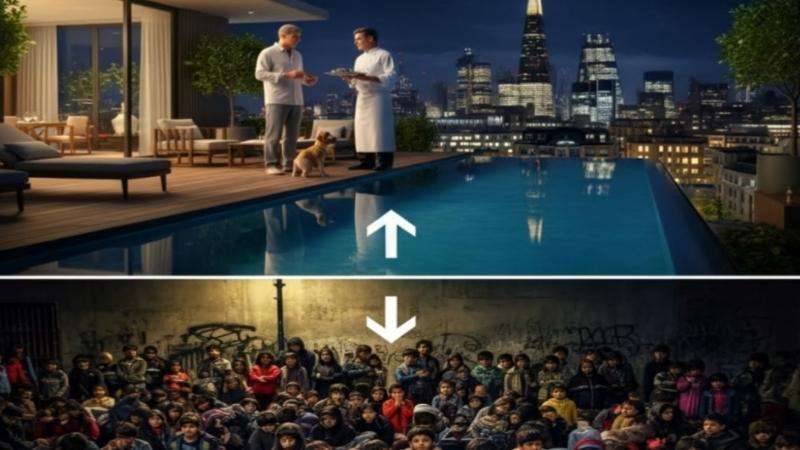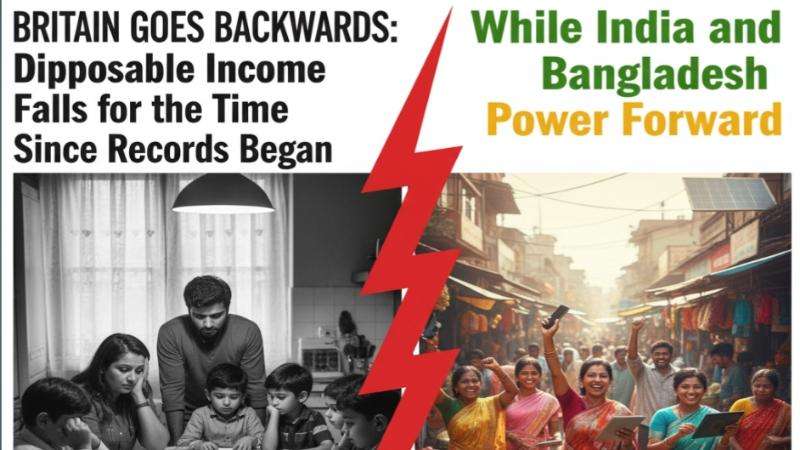The United Kingdom, once a dream destination for immigrants, is currently experiencing the most severe cost-of-living crisis in living memory. For newly arrived immigrants, their days are marked by the burning disappointment of their dreams being shattered in the supposed land of dreams.The United Kingdom is grappling with a profound living standards crisis, marked by the first time in recorded British history that the average person's disposable income has been lower at the end of a parliamentary term than at the start. Between the Conservative government's electoral victory in December 2019 and its defeat in July 2024, monthly disposable income per person plummeted by £40. This fall—roughly equivalent to an average person's weekly spend on food and drink—has been branded an "unmitigated disaster" for families, Daily Dazzling Dawn realised.
Disposable income, the money left after taxes and benefits but before essential outlays like rent, energy, and food, has been deeply eroded. Since 1955, living standards typically improved by an average of £115 per month between parliamentary terms, underscoring the severity of this unprecedented decline.
The Failure of Living Standards and the Role of Instability
The unprecedented failure in living standards is a product of a perfect storm of global and domestic factors, with political instability playing a significant exacerbating role.
Core Reasons for the Decline
Global Shocks and Inflation: The primary drivers were the COVID-19 pandemic and the subsequent period of highest inflation in a generation, amplified by the energy price spike following Russia's invasion of Ukraine. These global factors significantly drove up the cost of essentials.
Soaring Essential Costs: Prices for vital services—such as energy, food, and housing—have risen at a rate faster than overall inflation since 2019. This disproportionately impacts lower earners who spend a larger share of their income on these necessities, severely limiting their ability to save or spend on discretionary items.
Domestic Policy and Instability: Domestic political volatility, including the frequent changes in leadership and policy direction during the Conservative tenure and the ongoing economic fallout from Brexit (including increased 'red tape' and labour shortages), have created a climate of uncertainty that has deterred investment and contributed to a weaker growth outlook than in many comparable nations.
Lagging Wage Growth: For much of the period, income from wages and benefits has failed to keep pace with soaring prices, leading to a fall in real purchasing power.
The analysis by the Joseph Rowntree Foundation, which factors in housing costs, projects that the outlook remains difficult, with disposable income potentially £45 a month lower by September 2029 than when the new government took office. This suggests a potential decade-long stagnation in real incomes.
The UK's Living Standard vs. India and Bangladesh
While a direct, perfect comparison of individual monthly disposable income figures is challenging due to vastly different costs of living, purchasing power parity (PPP) data and overall economic context provide a stark contrast:
Gross Domestic Product (GDP) per Capita (PPP): The UK remains a significantly wealthier nation on a per capita basis. GDP (PPP) per capita is generally considered an indicator of a country's average standard of living. The UK's figure is still multiple times higher than that of both India and Bangladesh, reflecting a substantial difference in average wealth, infrastructure, and access to public services.
Income Inequality and Poverty: The UK's crisis is one of stagnation and reversal for a high-income nation. Conversely, while India and Bangladesh have a much lower average standard of living, they have both experienced strong economic growth and poverty reduction in recent decades, leading to a general, though uneven, improvement in living standards for many citizens.Adding to the complexity, within the UK, communities such as British Indian, British Bangladeshi, and newly arrived immigrants often draw a stark comparison between the UK's current economic struggles and the dynamic growth observed in their ancestral homelands or regions of origin. Many express surprise at the erosion of disposable income, noting that while the UK once represented an undisputed pinnacle of economic opportunity, the current stagnation and rising cost of living present challenges that, in some aspects, feel more acute than the upward trajectory witnessed in developing economies like India and Bangladesh. This perspective highlights the unique disappointment felt when the expected economic advantage of living in a developed nation diminishes.
The Nature of the Crisis: The UK's 'disaster' is an unprecedented decline in the context of its own historical prosperity, forcing a high-income population to face years of no real-terms income increase. For Indian and Bangladeshi citizens, the standard of living, though lower, is typically characterised by a rising trend, often driven by robust GDP growth.
In essence, the UK's issue is a historic failure to sustain expected growth and prosperity, whereas the challenge for India and Bangladesh is continuing their trajectory of catch-up growth and addressing persistent, deep-seated poverty.
Chance for Recovery: The Road Ahead
The chance to return to a "good" standard of living—meaning a return to the historic trend of consistent real-terms income growth—is dependent on a swift return to wider economic growth and political stability.
Current Trajectory: The new government saw an initial uplift in disposable income in its first six months (July-December 2024), partly due to pre-agreed public sector pay rises. However, this mask an underlying deterioration, as disposable income is now lower than it was at the start of 2025. This suggests the fundamental economic challenges of low growth and persistent inflation are yet to be overcome.
The Timeframe: Economists suggest that any meaningful "catch-up boost" would be required in the second half of the 2020s to offset the current slump. However, forecasts remain modest, with projections for real household disposable income (RHDI) per person growing at only an average of ½ per cent a year from 2025-26 to 2029-30. If current negative trends persist, the UK faces the prospect of the worst two consecutive parliaments for living standards growth since records began.
Political Instability's Cost: Political volatility has directly impacted economic confidence and long-term planning. Frequent policy shifts, a lack of clear strategy on key issues like investment and trade, and a challenging fiscal environment (high debt and interest rates) have contributed to weak productivity. Sustained political stability is seen as a crucial precondition for attracting the necessary investment and implementing the long-term reforms—in areas like investment, education, and planning—needed to break the cycle of low growth and falling real incomes.
Commenting on the matter, Monir Ahmad, one of the top leaders of the British Bangladeshi business organisation, the Chamber of Commerce, and the head of JMG Cargo, told the Daily Dazzling Dawn on Thursday,'We believe a significant and sustainable recovery requires a fundamental shift in the economic trajectory, which can be achieved through long-term policy commitments and the end of political and economic instability. However, it will take time. We may have to wait until after the current parliamentary term in 2029.'



_2.jpg)
_3.jpg)



.svg)



_7.jpg)